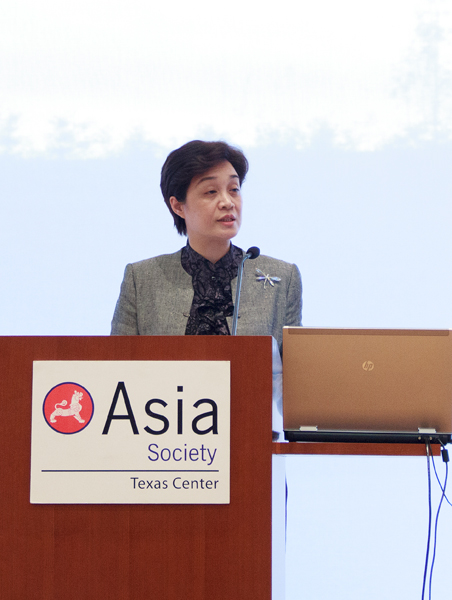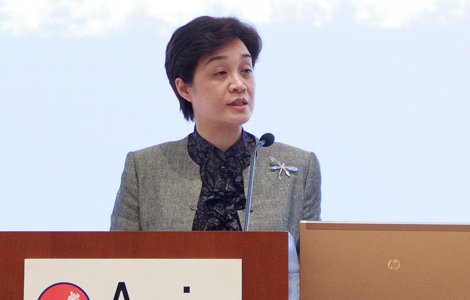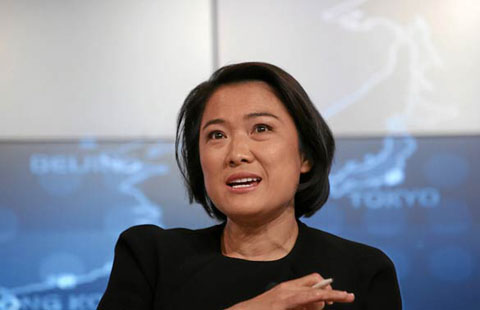Weighing in on justice in China
Updated: 2015-01-28 06:00
By MAY ZHOU in Houston(China Daily USA)
|
||||||||
 |
|
Tao Kaiyuan, grand justice and vice-president of the Supreme People's Court of China, discusses China's rule of law and legal reforms to an audience in Houston. MAY ZHOU / CHINA DAILY |
After 40 years of development, China's judicial system has yet to meet the expectations of the country's general public, but a series of reforms aim to achieve fairness and justice for all, according to a member of China's highest court.
Tao Kaiyuan, grand justice and vice-president of the Supreme People's Court of China (SPC), made the comment on Monday in a keynote address in Houston at the Asia Society Texas Center.
She led a six-member delegation to Houston, and will go to Washington to meet with US Supreme Court Justice Ruth Ginsburg and retired justice Sandra Day O'Connor.
China's judicial system is more open and public-friendly, Tao said. She cited as an example putting all court decision online for anyone to review, noting that as of Jan 10, 5.81 million cases have been put online.
The SPC also has tried new ideas such as opening its own micro-blog to upload real-time court minutes as it did in the trial of Bo Xilai, former party chief of Chongqing Municipality. A Chinese court sentenced him to life in prison in 2013 after finding him guilty of bribery, embezzlement and abuse of power.
Sometimes foreign diplomats have been invited to hear trials involving their citizens, Tao said.
Other reform efforts have included revising criminal trial procedure to ensure both investigation and prosecution can withstand the test of law and prevent wrong verdicts and injustice, she said.
As the environment has become more important for China, the SPC set up an environment and resources tribunal in 2013 to encourage public interest lawsuits, Tao noted.
The discussion was organized by the Asia Society Texas Center, Rice University, US China Partnerships, International Law Section of the Houston Bar Association and the Chinese Consulate General in Houston. It was attended by community leaders and attorneys, including State Representative Gene Wu and Harris County Judge Theresa Chang.
Y. Ping Sun of Rice University, an attorney, served as moderator for a question session with the audience.
Luo Dongchuan, chief judge of the Fourth Civil Division of the SPC, along with Tao, answered questions on China's intellectual property law, the procedure to collect evidence and Chinese law involving foreigners.
On foreigners, Luo said the Fourth Civil Division would adopt the law of the litigant's country, and that much effort has to be spent reviewing a particular nation's law on an issue to ensure a fair trial.
Houston attorney Charles Foster said in his welcoming remarks that China has made remarkable achievements in its economic development, and that it is equally important that China develops its legal system to realize the rights of all Chinese people under the Chinese constitution.
Chinese Consul General Li Qiangmin said that China has embraced a new round of legal reform with open arms and that the rule of law is a fundamental part of China's national policy. He welcomed the legal delegation's visit to further bilateral understanding between the US and China.
David Leebron, president of Rice University and a former law professor, said he has witnessed the remarkable changes in China since his first visit 30 years ago. "It's very encouraging that the delegation speaks to us specifically about the rule of law in China, acknowledges some of the challenges and has a frank discussion with us."
"In general the Americans know little about China's legal system, I hope this kind of discussion would help them to understand us better. We have studied the US law extensively and hopefully this exchange would balance the equation somewhat," Tao told China Daily.
On the meeting in Washington with Ginsburg and O'Connor, Tao said, "They both visited us in China about 10 years ago, and we would like to keep the dialogue open and ongoing, and establish direct judicial communication between us."
mayzhou@chinadailyusa.com

 Old photos of China's military parade
Old photos of China's military parade
 US, China expected to lead on climate talks
US, China expected to lead on climate talks
 Weighing in on justice in China
Weighing in on justice in China
 Northeastern US braces for 'crippling' blizzard
Northeastern US braces for 'crippling' blizzard
 At least 2 dead, dozens hurt after bus hits road barrier
At least 2 dead, dozens hurt after bus hits road barrier
 Red carpet of 21st annual SAG Awards in Los Angeles
Red carpet of 21st annual SAG Awards in Los Angeles
 New Year celebrated with dance mix
New Year celebrated with dance mix
 Businesswomen shine at the World Economic Forum
Businesswomen shine at the World Economic Forum
Most Viewed
Editor's Picks

|

|

|

|

|

|
Today's Top News
US, China expected to lead on climate talks
Weighing in on justice in China
China wants US to help build trust on maritime disputes
Yahoo to spin off Alibaba shares
China to open markets to all apples from US
Parade will commemorate victory over Fascism
Expatriates to be lured for startups
Beijing gears up for Super Bowl
US Weekly

|

|







